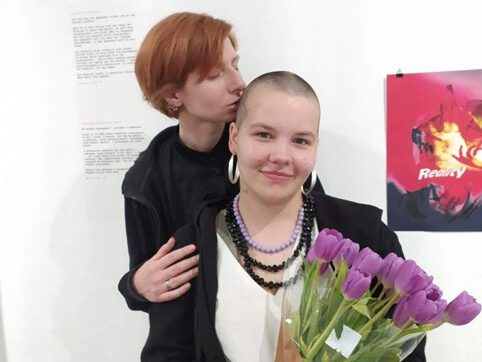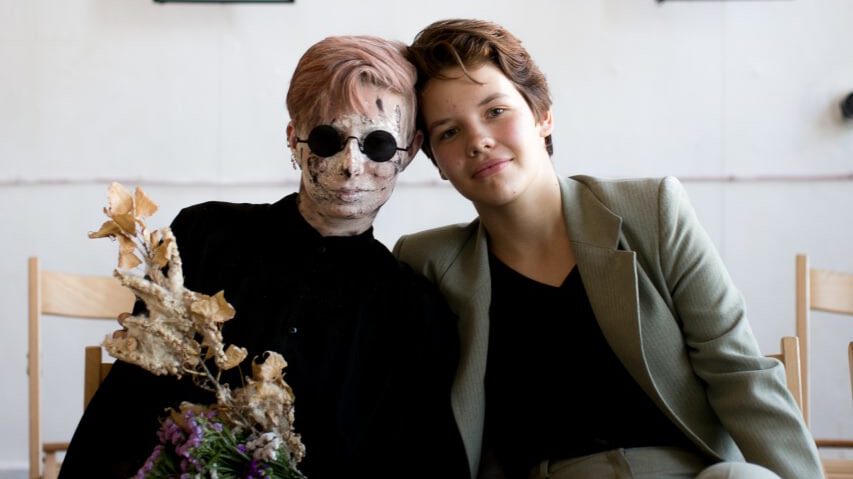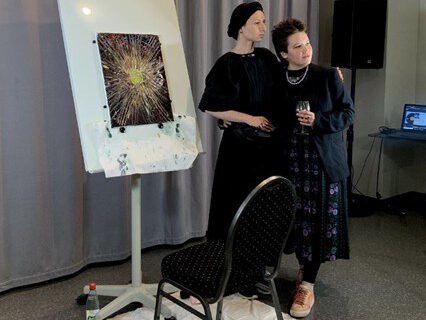“My sister died”
Hanna and Oleksandra, a lesbian couple from Odesa, have been through a lot. The family was separated when they were on the run, Oleksandra’s sister later died in Germany. Our group member and activist Iryna Hanenkova asked them to tell their story. Today they live in Dresden and try to fight for their country in their ways: Sascha paints, Hanna sings.
Hanna: On the night of February 24, Sasha (short for Oleksandra; editor’s note) had just returned to Odesa from Kyiv. She had taken part in an exhibition with one of her collages. At the beginning of the month, she had thought long and hard about whether she should go to Kyiv at all. Eventually, she packed her suitcase.
We were hiding in grandmother’s house
On the night of the 23rd to the 24th I couldn’t sleep because of the bad news; I was waiting for Sasha. Around 3 am I heard the sound of a plane, definitely not an ordinary plane, more like the kind you hear in war films. At 3.50 am I got Sacha off the train.
When we entered the house around 4 am, we heard the first explosions. The chats on Telegram were immediately full – everyone heard it. There was no time to shower. We gathered our things, then I called my grandmother and we hid in her basement.

Oleksandra: We were lucky then. There was a seat left for us in my trans* mother’s car; yes, she also belongs to the community. My stepbrother refused to leave Odesa.
Me, my trans* mother, my stepmother, my 14-year-old sister, my girlfriend and a big dog – all in one car. This is how we set off on the first day. With only a few bags. We left the cat with my grandmother. My mother, the other sisters, the grandparents stayed in Ukraine.
We were in panic
We drove 18 hours to the Moldovan border and another four hours to the capital Chisinau. We sought shelter with an LGBTIQ* organisation, which an activist, Hanna’s friend, had advised us to do, simply because it seemed safer for us. After all, everyone in my family identifies as LGBTIQ* in one way or another.
In Moldova, we stayed in a kind of women’s shelter. We stayed there from February 25 to March 2. We got clothes, a backpack (because the old one was no good anymore), went to the psychologist several times. We felt a lot of guilt, and fear, fear of everything.

On March 2 we set off for Romania. The journey was difficult, we faced cold weather, one of our headlights broke, it was snowing like crazy, serpentines everywhere. We got as far as Iași at night and found shelter with some hosts. The television was showing news about Ukraine.
On March 3 we went to Bucharest, where we stayed until March 7. I celebrated my 20th birthday on this trip. In Timisoara, a town on the border with Hungary, we stayed for two days with a wonderful couple who bred Labradors.
I never saw my family again
On March 9 we travelled on to Vienna. We stood for a long time at the border with Hungary and as we saw, it was difficult for all Ukrainian refugees to cross this border. But we made it and got to Vienna in about six hours.
There our family was separated. We, Hanna and I, planned to go to Dresden. My trans* mother, stepmother and sister wanted to go to Siegen because they knew a doctor there who would help them. After that we lost contact. In fact, we haven’t seen them since February 19. On March 10, Hanna and I reached our final destination.

Hanna: In Dresden, we first lived in a flat we found through Facebook. Since May we have been in a hostel. Very different people of all nationalities live here. That helps me a lot.
Sasha and I both try to raise funds for Ukraine. Sascha offers exhibitions with her collages, I work with traditional Ukrainian songs. I have gathered a group of very different people, not only Ukrainians. I believe that we have to tell everyone about this war.
We talk, raise funds, create
Fortunately, we both are able to communicate more or less well in English and German. I was a foreign language teacher before the war, Sasha finshed her school in German.
I explain to everyone who asks me, as a Ukrainian, what is going on in Ukraine. Russian narratives are unfortunately spread almost everywhere here. I got in touch with a historian and will do a project with him to help people not to see Ukrainian culture from the Russian point of view.
In the summer, Sasha’s 14-year-old sister died; she suffered from depression. We now want to do an art project to do her honours. This is important for us personally, at the same time we want to tell people that war is a terrible thing that doesn’t just kill somewhere far away, but affects everyone, even those who aren’t fighting at the front.
My personal war – unfortunately I am not allowed to go to war because my joints hurt and I can’t walk much – is to make people realise that this is not just any conflict. That it didn’t start yesterday or even centuries ago, but that it is a struggle for humanity and democratic values in the now.
We fight for our freedom
I am an ethnic Ukrainian who speaks Ukrainian and identifies as a non-binary Ukrainian. I was born and went to school in the USSR in what is now Tatarstan (Russia). I was constantly discriminated and saw how others who were different like me suffered, but I could do nothing. The repressive system in Russia is cruel; most people are conformist and not ready for confrontation. And those who raise their heads end up either in prison or in a coffin. If they are lucky, they can leave the country.
At the first opportunity, I moved to the country to the people I really feel are my own. Now the Russians came to kill my people. I understand very well what I am fighting for and I want everyone to understand that.
Here is how you can help:
Individual help
Munich Kyiv Queer has its own fundraising campaign via www.paypal.me/ConradBreyer to support people in Ukraine with whom we have worked closely over the past ten years. They are our friends and partners. We know them personally and we miss them. We can help fast, directly and unbureaucratically.
Help for LGBTIQ* organisations
To support LGBTIQ* in Ukraine we have helped set up the Alliance Queer Emergency Aid Ukraine, in which around 40 German LGBTIQ* Human Rights organisations are involved. All these groups have access to very different Human Rights organisations in Ukraine and use funds for urgently needed care or evacuation of queer people. Every donation helps and is used 100 percent to benefit queer people in Ukraine. Donate here
Questions? www.MunichKyivQueer.org/donations
Back to overview